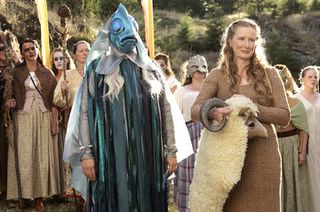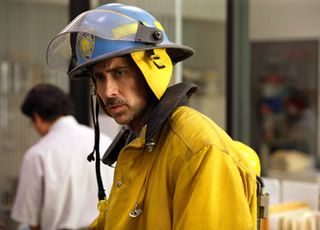Badge Patrol
Two different Nicolas Cage movies have hit DVD in the past few weeks, and he plays police officers in both. Oh, and they both have titles that begin with the letter "W." That's about all they have in common.
THE WICKER MAN
Mormon moralizer/writer/director Neil LaBute remakes Anthony Shaffer and Robin Hardy's 1973 cult classic, surgically removing all the screwy fun and replacing it with vapid horror cliches. Hirign Neil LaBute to rework this grim story of paganism run rampant on an isolated island makes a kind of perverse sense. Of all the major religions being practiced in America today, Mormonism is clearly the most cult-like. (I'm not saying it's a cult, necessarily. Just that it is somewhat cult-like.)
Additionally, LaBute has repeatedly turned to the idea of karmic retribution in his work. At the heart of romantic horrorshows like Your Friends and Neighbors and In the Company of Men is a burning question: How can we be expected to make righteous decisions in a world where evil deeds have no consequences? Can we even, under such circumstances, be certain about what it means to behave righteously?
Certainly, these ideas are at play in a story about a religious man who descends into a living nightmare while investigating a bizarre cult on a remote island.
But, no, rather than focus on anything interesting about the original Wicker Man, LaBute has made a stupid, mindless and boring Hollywood horror movie out of the raw materials of its plot. The only thing that remains consistant from his previous, more interesting work is his continued lack of regard for female characters. Typically, LaBute's women are either spineless doormats who crave male attention and dominance (like Amy Brenneman in Your Friends and Neighbors) or conniving, castrating hellsluts (like Rachel Weisz in The Shape of Things). I saw a production of LaBute's play Bash! in Washington DC a few years back, which includes a monologue based on Medea, who murdered her children to please her lover. (Calista Flockhart did the scene in the play's New York run). That myth sets the tone for all of the man's fictional women - cold, needy, possessive, capable of grim violence if pressed.
I know that Americans are extremely sensitive when it comes to the combination of sex and religion in fiction, but The Wicker Man doesn't really make sense without them. In the original film, the inhabitants of Summerisle (off the coast of Scotland) practice a form of paganism that's focused obsessively on human sexuality. At times, the film almost feels like softcore pornography, particularly in a goofy scene where Britt Ekland does a silly dance in the buff. The locals' free-spirited, earthy, orgy-esque rituals are then purposefully contrasted with the rigid, uptight Christianity of Edward Woodward's policeman character.
In LaBute's update, unsuspecting police officer Edward Malus (Cage) witnesses a car accident that causes him significant psychological trauma. (We know he's bothered by the memory because he keeps having flashbacks in black-and-white with dramatic music playing in the background.) He then receives a mysterious letter from an old girlfriend, Willow. (This is Britt Ekland in the original, here played sans naked dancing by Kate Beahan). Willow's daughter has gone missing somewhere on Summersisle and the community's elders aren't talking; she wants Edward to come there and find out the truth.
(Oddly, LaBute changes the island's name from Summerisle to Summersisle. What gives?)
Edward finds his way to the remote island (this time located near Washington State), only to find his investigation treated with hostility by the matriarchal society of beekeepers therein. This is doubly unfortunate for Edward - none of these women will tell him anything, because they loathe and mistrust men, and his allergy to bee stings puts him at great risk on an island devoted largely to hive maintenance. And eventually he learns the shocking secret as to why he's been called to Summersisle, which is not shocking in the 1973 original but is even less shocking here.
By changing these central concepts around, LaBute robs the story of its guiding metaphors, themes and purpose. Anything to focus on, really. Now, it's just a silly story about a guy who finds himself in a mixed-up crazy world full of feminist witches who continually sic their mean-tempered insect friends on him. Even the additional element LaBute added himself, the opening with the car accident and Edward's continual use of mind-altering medication throughout the film, ends up being totally irrelevant.
What's odd is that LaBute has made dark comedy before, and that's undoubtedly the spirit of Hardy's original film. So why is the new version such a grim, pallid undertaking? It's perfectly obvious from the start what everyone's up to merely by their behavior. In the original film, the villagers behave mysteriously and keep their motives unknown. Here, they're clearly plotting against Malus from the first scene. The plot unfolds with no surprise or tension at all. "Trouble's coming...Oh, man, something unsettling's going to happen...Here it comes...Oh, that was it!"
Seriously, I've given this some thought, and nothing in this film works. Certainly, none of the changes feel worthwhile or well-considered. Recasting the Christopher Lee role in the original with Ellen Burstyn (Lord Summerisle becomes Sister Summersisle, because now it's a matriarchy) was an inspired touch, but the part has been severely reduced. Burstyn doesn't appear until the end of the film, and she's certainly not a threatening figure, in her flowing robes and blue war paint. The entire ritual that closes the film, with its focus this time around on the cruelty and barbarism of the act itself, feels tame and incomplete, like an afterthought. But if LaBute wasn't interested in the religious commentary of the original film, nor with exploring the Christopher Lee character, nor with the frank sexuality, nor with the dark comedy, nor with the iconic imagery of the conclusion...what the hell did he want to remake Wicker Man for in the first place?
WORLD TRADE CENTER
Paul Greengrass' deeply inappropriate United 93 has won Critics' Association awards and end of the year accolades across the country. (Recently, it won the Dallas-Ft. Worth Critics poll as Best Picture, historically the most accurate indicator of who will win the Oscar.) It seems likely that my least favorite movie of the year will win Best Picture two years in a row!
I hated that movie and felt that Greengrass was attempting to crassly use the subject of 9/11 to confer some kind of "seriousness" to himself and his filmmaking. So I understand that, before I can praise Oliver Stone's 9/11 movie, some explanation is in order.
Stone's film, in which Cage and Michael Pena portray two real New York City Port Authority officers who were stuck under the rubble of Ground Zero when the Trade Center collapsed on top of them, follows a traditional dramatic narrative. It is a story of bravery and survival, about two guys who unquestioningly went to do their difficult job, and all of the other men and women who rose to the challenge when they needed rescue.
United 93 serves no purpose - it documents an unfolding tragedy with accuracy (as near as I can tell...), but without thought. The film has no perspective beyond its own self-importance. It knows it matters, and it knows the order in which things happened on September 11th, but that's about all it knows.
Now, one could certainly take issue with the ideas and assumptions behind Oliver Stone's film, but even that would concede it has some ideas and assumptions. It's not just terrorism porn. (In fact, there really isn't anything in the way of on-screen terrorism. One minute there are buildings, the next there's a lot of rubble.) It is, in many ways, a simple movie with a simple story. It's about heroes, how the truly bold individuals will do something dangerous without consideration for their own safety, if it's the right thing to do. It's about how being needed, desperately needed, is both a great blessing and a horrible curse.Like a lot of Stone's films, it gets a little hokey and lays on some symbolism a bit too thick. But as a testament to the horror of being buried alive and to the selfless bravery of the rescue workers of 9/11, it's extremely visceral and effective.
John McLoughlin (Cage) gets the call after the first plane hits the Trade Center. He prepared the contingency plans for an attack on the WTC after the first plot in 1993, so he's the natural choice to head up the Port Authority's task force on 9/11. Whiel McLoughlin heads downtown, the second plane hits and the city enters panic mode. He and his team are just unpacking and getting their bearings when the towers implode literally on top of their heads. McLoughlin and a rookie on his team, Jimeno (Pena), survive by diving into an open elevator shaft. Most aren't so lucky.
The rest of the film cuts between McLoughlin and Pena, pinned beneath 20 feet of rubble, their worried families and the motley assemblage of motivated citizens scanning Ground Zero for survivors. Though they are the most familiar (many feel ripped right out of Apollo 13), the scenes with the wives aren't as bland as you'd normally expect in a film like this, due mainly to the two actresses in the roles.
Maria Bello plays Donna McLoughlin as an expert at face-saving duplicity. Privately, she's a basket case once the word comes in that her husband is MIA, but she pulls it together for the sanity of her fellow cop wives and her kids. Maggie Gyllenhaal doesn't have much to do as Allison Jimeno, but does get in one really great, very real moment towards the end of the film, cracking one of the film's lone warm smiles as a sense of relief washes over her face.
Intense and wrenching as the scenes underground are, the most interesting, compelling material follows the rescue workers above ground, risking their own necks combing the still-smoldering crash site in an increasingly-futile attempt to save lives. I'm not sure I've ever seen a movie about rescuing individuals trapped under collapsed buildings, and World Trade Center does a great job of emphasizing the horror of being pinned by twisted steel and concrete and the laborious difficulty of extracting individuals stuck in this way.
As this is an Oliver Stone film, albeit a restrained one, there are still a few cornball excesses. Fantasy sequences in which Jesus shows up to bring the unfortunates water interrupt the flow of these scenes. It's a cheap device that reminds you you're watching a movie, and kind of an exaggerated, eager-to-please one at that. A few lines of dialogue here and there similarly break the reality of the film. (At one point, a Marine who has come to the rescue announces, "We are Marines and you are our mission!" and I rolled my eyes clear into the next apartment.)
But overall this is a surprisingly strong film about a subject I was not keen to see depicted on screen. I think the secret is that, though it's about a true story of 9/11, the subject is much more broad. Stone tells a simple narrative about people uniting to help one another. He and screenwriter Andrewa Berloff use sentimentality, but only for emphasis, not fatally so. Don't believe the hype - this is the significantly stronger 9/11 film in pretty much every way. Rather than fetishizing terrorism as a stylistic exercize, Stone has mined a recent tragedy to find a glint of hope and inspiration amidst the terror.

No comments:
Post a Comment